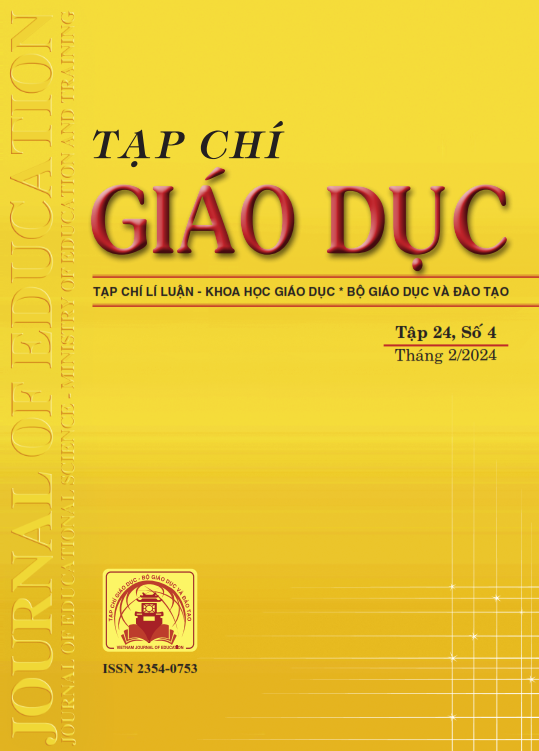Nghiên cứu các yếu tố tác động đến sự sẵn sàng sử dụng hệ thống đào tạo trực tuyến của giáo viên các trường trung học phổ thông ở khu vực Đồng bằng sông Cửu Long: trường hợp nghiên cứu UEH Global Learning
- Từ khóa:
- Training
- online
- teacher
- UEH
- Global learning
Tóm tắt
UEH Global Learning online training system is a community project of the University of Economics Ho Chi Minh City that aims to share and transfer experience in free digital transformation in teaching and learning activities for high school teachers, especially in the Mekong Delta region. To ensure the effective use of this system, it is necessary to clearly understand the factors that impact teachers' willingness to use. Those are the factors with relatively high importance and relatively low effectiveness. The research study is based on the survey results of 195 high school teachers in the Mekong Delta region who participated in the UEH Global Learning training class, conducting quantitative analysis using the PLS-SEM model identified 9 factors. The impacts include: (1) Information quality, (2) System quality, (3) Service quality, (4) Usefulness, (5) Ease of use, (6) Attitude, ( 7) Intention, (8) Social Influence and (9) Satisfaction. In addition, the researcher used the IMPA method to identify two influential factors with relatively high importance and relatively low performance: Attitude and Intention. The research results have practical implications to further improve the effectiveness of using UEH Global Learning in teaching practice.
Tài liệu tham khảo
Al-Busaidi, K., & Al-Shihi, H. (2010). Instructors’ Acceptance of Learning Management Systems: A Theoretical Framework. Communications of the IBIMA. https://doi.org/10.5171/2010.862128
Al-Busaidi, K.A., & Al-Shihi, H. (2012). Key factors to instructors’ satisfaction of learning management systems in blended learning. Journal of Computing in Higher Education, 24(1), 18-39.
Al-Fraihat, D., Joy, M. S., Masa’deh, R. e., & Sinclair, J. (2020). Evaluating E-learning systems success: An empirical study. Computers in Human Behavior, 102, 67-86.
Browne, T., Jenkins, M., & Walker, R. (2006). A longitudinal perspective regarding the use of VLEs by higher education institutions in the United Kingdom. Interactive Learning Environments, 14(2), 177-192. https://10.1080/10494820600852795
Cohen, J. (1988). Statistical Power Analysis for the Behavioral Sciences (2nd ed.). Hillsdale, NJ: Lawrence Erlbaum
Associates, Publishers.
DeLone, W. H., & McLean, E. R. (1992). Information systems success: The quest for the dependent variable. Information Systems Research, 3, 60-95. https://10.1287/isre.3.1.60
DeLone, W., & McLean, E. (2003). The Delone and Mclean model of information systems success: A ten-year update. Journal of Management Information Systems, 19(4), 9-30.
Dhika, H., Destiawati, F., & Sonny, M. (2019, March). Study of the use and application of the Moodle e-learning platform in high school. Journal of Physics: Conference Series (Vol. 1175, No. 1, p. 012219). IOP Publishing.
Etom, R., Pabatang Jr, O., Dapanas, K. M. M., Consolacion, R., Iniego, J. M., Jumao-as, A. M., ... & Tee, K. C. (2021). The use of elearning tools in blended learning approach on students’ engagement and performance. Journal of Physics: Conference Series (Vol. 1835, No. 1, p. 012075). IOP Publishing.
Garson, G.D. (2016). Partial Least Squares: Regression and Structural Equation Models. Statistical Associates Publishers, Asheboro.
Hawkins, B. L., & Rudy, J. A. (2007). Educause core data service. Fiscal year 2006 summary report. Colorado, USA: Educause.
Henseler, J., & Sarstedt, M. (2013). Goodness-of-Fit Indices for Partial Least Squares Path Modeling. Computational Statistics, 28, 565-580. https://doi.org/10.1007/s00180-012-0317-1
Höck, M., & Ringle, C. M. (2010). Local strategic networks in the software industry: an empirical analysis of the value continuum. Int. J. Knowledge Management Studies, 4(2), 132-151.
Liaw, S., Huang, H., & Chen, G. (2007). Surveying instructor and learner attitudes toward e-learning. Computers & Education, 49, 1066-1080. https://10.1016/j.compedu.2006.01.001
Lưu Hớn Vũ (2022). Các nhân tố ảnh hưởng đến sự hài lòng của sinh viên về chất lượng đào tạo trực tuyến tại Khoa Ngoại ngữ - Trường Đại học Ngân hàng Thành phố Hồ Chí Minh trong bối cảnh Covid-19. Tạp chí Khoa học, Trường Đại học Mở Thành phố Hồ Chí Minh - Khoa học Xã hội, 17(1), 73-85.
Motaghian, H., Hassanzadeh, A., & Moghadam, D. K. (2013). Factors affecting university instructors’ adoption of web-based learning systems: Case study of Iran. Computers & Education, 61, 158-167.
Pham, L. T., & Dau, T. K. T. (2022). Online learning readiness and online learning system success in Vietnamese higher education. The International Journal of Information and Learning Technology, 39(2), 147-165.
Samaradiwakara, G., & Gunawardena, C. (2014). Comparison of existing technology acceptance theories and models to suggest a well improved theory/model. International Technical Sciences Journal, 1(1), 21-36.
Teo, T. (2009). Modelling technology acceptance in education: A study of pre-service teachers. Computers & Education, 52, 302-312. https://10.1016/j.compedu.2008.08.006
Venkatesh, V., & Davis, F. (2000). A theoretical extension of the technology acceptance model: Four longitudinal. Management Science, 46(2), 186-204. https://10.1287/mnsc.46.2.186.11926
Wang, W., & Wang, C. (2009). An empirical study of instructor adoption of web-based learning systems. Computers & Education, 53(3), 761-774. https://doi.org/10.1016/j.compedu.2009.02.021
Yuanquan, L., Jiayin, Q., & Huaying, S. (2008). Review of relationships among variables in TAM. Tsinghua Science and Technology, 13(3), 273-278.
Yuen, A. H. K., & Ma, W. W. K. (2008). Exploring teacher acceptance of e-learning technology. Asia-Pacific Journal of Teacher Education, 36(3), 229-243.
Tải xuống
Đã Xuất bản
Cách trích dẫn
Số
Chuyên mục
Giấy phép

Tác phẩm này được cấp phép theo Ghi nhận tác giả của Creative Commons Giấy phép quốc tế 4.0 .












